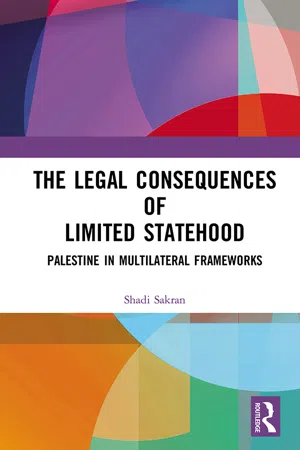1 Many multilateral frameworks delimit their participation to formal States, see e.g., Henry G. Schermers and Niels M. Blokker, International Institutional Law: Unity Within Diversity, 5th ed. (Leiden and Boston: Martinus Nijhoff Publishers, 2011), 64: “The most important members of international organizations are states. Indeed, many constitutions of organizations expressly require statehood as a condition for membership” (footnotes omitted); from a similar strand, Yuval Shany, “In Defense of Functional Interpretation of Article 12(3) of the Rome Statute: A Response to Yaël Ronen,” Journal of International Criminal Justice 8, no. 2 (2010): 335, in which he argues that “Formal statehood remains an absolute prerequisite for membership in some international organizations, such as the UN, and for participation in many treaties” (reference has been made to the Geneva Conventions and their Additional Protocols, and Palestine as an example of being rejected by the depositary of these treaties in 1989, Switzerland); on the UN Membership: Robert Kolb, The Law of Treaties: An Introduction (Cheltenham and Northampton: Edward Elgar Publishing, 2016), 106, in which he argues that “Only States may be members of the United Nations in accordance with Articles 3–4 of the Charter. The organization is above all an ‘inter-State club.’” This, again, has been mentioned in respect to accession to the ICC: Daniel Benoliel and Ronen Perry, “Israel, Palestine, and the ICC,” Michigan Journal of International Law 32, no. 1 (2010): 79. Benoliel and Perry argue: “The state-based system was clearly preserved within the Rome Statute. At the outset, the Statute contains many provisions, some complex concerning the ICC’s jurisdiction. No provision, with a single exception to be discussed below, transcends the state-based system … Moreover, as it is currently configured, the Rome Statute is not open to ratification by entities other than states recognized by the United Nations. Furthermore, rule 44.1 of the ICC Rules of Procedure and Evidence states that the Registrar, upon request of the Prosecutor, may inquire of a state that is not ‘a Party to the Statute’ or that ‘has become a Party to the Statute’ after its entry into force, on a confidential basis, as to whether it intends to make the declaration provided for in Article 12(3). The rule thereby limits the Prosecutor’s discretion to states.” Another example of international organization that limit its admission to “States” is witnessed in the membership of ICPO-Interpol. Constitution of the International Criminal Police Organization, June 13, 1956, (I/CONS/GA/1956(2017), art. 4, which stipulates the following: “Any country may delegate as a Member to the Organization any official police body whose functions come within the framework of activities of the Organization.” The term country used in ICPO-Interpol constitution was not defined until September 2017. ICPO-INTERPOL General Assembly, adopted a resolution on “The process for membership of INTERPOL.” In this regard, the ICPO-Interpol General Assembly resolved that “the word ‘country’ in Article 4 of the Constitution shall be interpreted as ‘state’ and that, as of September 27, 2017, the INTERPOL membership shall be open to ‘states’ as Members of the Organization.” It has been further explained that “Under this heading the requesting country should explain that it meets the conditions for statehood: a territory; a population; a government; and capacity to enter into relations with other states. An important element is also that the requesting country mentions if it is a member of other intergovernmental organizations and, in particular, if the country is a Member of the United Nations or an Observer State recognized by the United Nations.” The Process for Membership of INTERPOL, ICPO-Interpol Doc GA-2017-86-RES-01, at 3 (September 26–29, 2017), www.interpol.int/content/download/5728/file/GA-2017-86-RES-01%20-%20The%20process%20for%20membership%20of%20INTERPOL.pdf.
2 The most accepted requisites of statehood are set out in the instrument of the Montevideo Convention on Rights and Duties of States, December 26, 1933, 165 LNTS 19, art. I, which was signed at the Seventh International Conference of American States in Uruguay in 1933 (hereinafter the Montevideo Convention). Article I of the Montevideo Convention defines State as a person of international law that should possess the following requirements: “a) a permanent population; b) a defined territory; c) government; and d) capacity to enter into relations with the other states.” For a literature review on the traditional requisites of statehood and in particular on the Montevideo Convention, see e.g., Thomas D. Grant, “Defining Statehood: Montevideo Convention and its Discontents,” Columbia Journal of International Law 37, no. 2 (1999): 403–457; James Crawford, The Creation of States in International Law, 2nd ed. (Oxford and New York: Oxford University Press, 2006), 37–95; David Raič, Statehood and the Law of Self-Determination (The Hague, London and New York: Kluwer Law International, 2002), 49–88; and Jure Vidmar, Democratic Statehood in International Law: The Emergence of New States in Post-Cold War Practice (Oxford: Hart Publishing, 2013), 39–42.
3 See William T. Worster, “Functional Statehood in Contemporary International Law,” SSRN, last revised December 27, 2017: 26, https://dx.doi.org/10.2139/ssrn.2807156. Wosrter observes that there “are numerous situations where there is an entity that, for one reason or another, cannot be or will not be considered a state. However, the international community needs to engage with those same entities in various functional ways for pragmatic reasons. For lack of a different paradigm, the entity is therefore treated as if it were a state on a functional basis, while all the while continuing to refuse it formal statehood.”
4 The legal effect on admissions to international organizations will be extensively discussed in Chapter 2.
